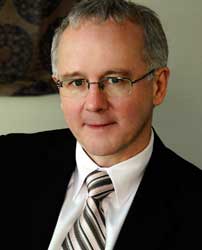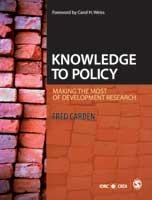Making research count by influencing policy decisions
June 2010 | Volume 9, Issue 3
Guest Opinion by Dr. Fred Carden

Photo courtesy of Dr. Fred Carden
Dr. Fred Carden says that even in unpromising
conditions, circumstances arise that can
create new opportunities for well-prepared
researchers to seize the moment for influence
when it occurs.
When research is well designed and executed - and skillfully communicated - it can inform policy that is more effective, more efficient, and more equitable. But in all the confusions and frustrations of making policy in developing countries, research frequently fails to register any apparent influence whatsoever. What explains those successes and the failures? And how best can researchers and policymakers bring timely, relevant, and reliable new knowledge to bear on policy decisions in developing countries?
The overarching objective of development research is to improve the lives of people in developing countries. More often than not, public policy is an indispensable instrument for converting new knowledge into better lives and better futures. And the urgency is equally pressing for the policy community. After all, systematic access to evidence-based research advice can dramatically improve the chances of deciding and carrying out policy that achieves intended results and attracts durable public support. Researchers and policymakers do not always speak the same language. But they can find a common cause in the pursuit of development policy that is just and sustainable.
To work at making research count is to act on the powerful logic that propels and justifies development research anywhere. This is research that informs stronger policy, that engages citizen participation in accountable government, that releases a country’s economic energies and inventions, and that fosters the capacity of marginalized people in poor countries to discover new choices for growth and change. This is research for better governance.
Implementation challenges greater in developing countries
In any country there are gaps between the stated aims of a policy and its outcomes, because design and implementation can never fully anticipate all contingencies. But the gaps open more deeply in developing countries for three reasons. First, policy design capabilities may be weak, and policy designed by international agencies may fail to reflect local conditions and government priorities. Second, good policy can be defeated by inadequate administrative, legal, or management capacity in execution. And third, implementation can be undercut by graft or incompetence unchecked by sufficient monitoring and accountability.
New opportunities can spur progress

Image courtesy of Dr. Fred Carden
In his new book, Dr. Fred Carden
says that when research is well
designed and executed, it can
inform policy that is effective,
efficient and equitable.
Circumstances arise even in the most unpromising conditions that can suddenly create new opportunities for researchers to influence policy and achieve real development progress. History points to three critical moments when research can become exceptionally influential.
First, economic crisis, unambiguous policy failure or radical political change can inspire policymakers to seek research advice that they would previously have ignored or dismissed. These abrupt attitudinal swings reward researchers who are already prepared to present specific and practical solutions to policymakers’ problems.
Second, societies and political systems undergoing transition have generated new and unexpected opportunities for researchers to influence fresh policy in the making. Settings as different as South Africa and Vietnam have proven hospitable to evidence-based policy guidance in the midst of turbulent change.
Third, the advent of new and pervasive technologies encourages policymakers to explore new questions, and to try new answers. The revolutions in information and communication technologies - from cellular phones to web-based commerce and education - have caused policymakers to search out knowledgeable advice. When a problem or solution is so obviously unprecedented, policymakers can more safely admit ignorance. Again, researchers who already have helpful findings in hand are best placed to answer policymakers’ questions with prompt and reliable advice.
Trust and patience required to influence change
The well prepared researcher can seize the moment for influence when it occurs. Obstacles and defects in policymaking processes can be overcome when development research is devised and executed well, and communicated to policymakers in a form that contributes to timely and pragmatic decisions.
The purpose of development research is to improve the lives of poor people in poor countries. This takes time. And it requires the building of relationships between members of the research and the policy communities - relationships of trust, strengthened by reliable, helpful work on both sides of the research-policy partnership.
Dr. Fred Carden is evaluation director at the International Development Research Centre in Ottawa, Canada. His new book, Knowledge to Policy: Making the Most of Development Research, is available online for free download or purchase.
To view Adobe PDF files,
download current, free accessible plug-ins from Adobe's website.